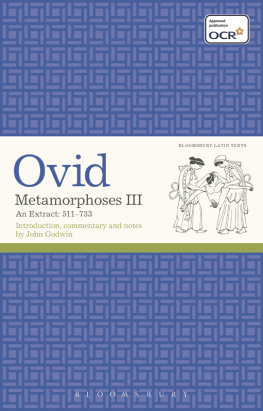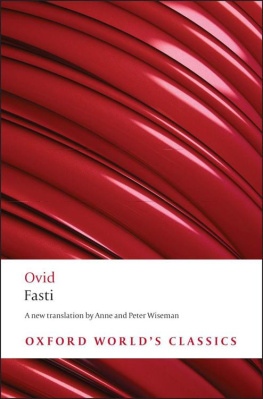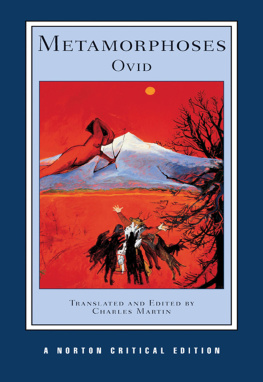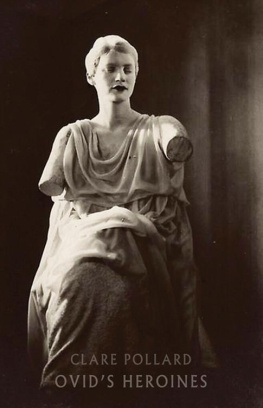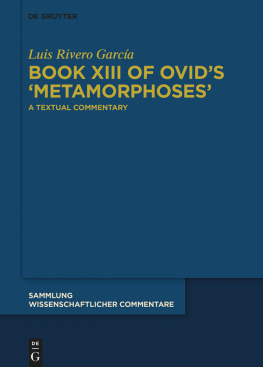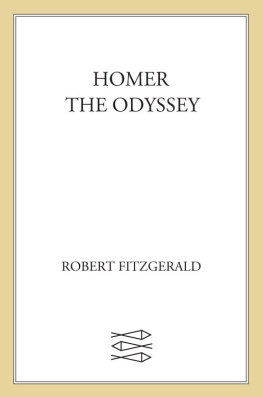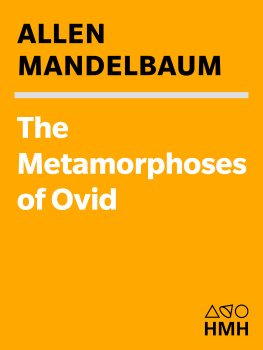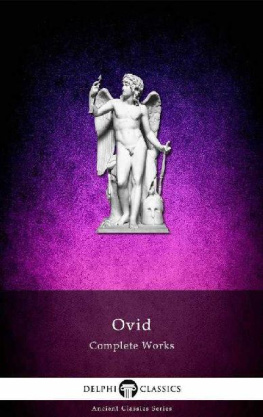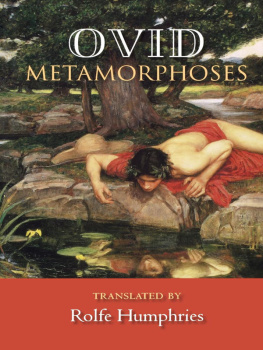Ovid - Metamorphoses III: An Extract 511-733
Here you can read online Ovid - Metamorphoses III: An Extract 511-733 full text of the book (entire story) in english for free. Download pdf and epub, get meaning, cover and reviews about this ebook. publisher: Bloomsbury Academic, genre: Detective and thriller. Description of the work, (preface) as well as reviews are available. Best literature library LitArk.com created for fans of good reading and offers a wide selection of genres:
Romance novel
Science fiction
Adventure
Detective
Science
History
Home and family
Prose
Art
Politics
Computer
Non-fiction
Religion
Business
Children
Humor
Choose a favorite category and find really read worthwhile books. Enjoy immersion in the world of imagination, feel the emotions of the characters or learn something new for yourself, make an fascinating discovery.
- Book:Metamorphoses III: An Extract 511-733
- Author:Ovid /
- Publisher:Bloomsbury Academic
- Genre:
- Rating:5 / 5
- Favourites:Add to favourites
- Your mark:
- 100
- 1
- 2
- 3
- 4
- 5
Metamorphoses III: An Extract 511-733: summary, description and annotation
We offer to read an annotation, description, summary or preface (depends on what the author of the book "Metamorphoses III: An Extract 511-733" wrote himself). If you haven't found the necessary information about the book — write in the comments, we will try to find it.
Metamorphoses III: An Extract 511-733 — read online for free the complete book (whole text) full work
Below is the text of the book, divided by pages. System saving the place of the last page read, allows you to conveniently read the book "Metamorphoses III: An Extract 511-733" online for free, without having to search again every time where you left off. Put a bookmark, and you can go to the page where you finished reading at any time.
Font size:
Interval:
Bookmark:
This is a short extract from a long poem, telling a grisly tale of an impious king getting his just deserts from an angry god. The tale is simple: King Pentheus of Thebes is outraged that his people are worshipping this strange god Bacchus and is determined to put a stop to their revelry for Bacchus is the god of wine and various forms of ecstasy and his worship was uninhibited and must have been alarming to onlookers and rulers. The king sends his men to sort out these Bacchic worshippers but the men come back defeated. Along with them comes a stranger, Acoetes, with his own tale to tell. He had been on a voyage when they put into the shore for the night: his men find a young boy wandering around and decide to kidnap him for a ransom, despite Acoetes demands that they do no such thing. The ship sets sail and suddenly the boy turns out to be the god Bacchus himself who stops the ship with ivy growing up the oars and masts and then turns the sailors into dolphins. Acoetes warns King Pentheus to beware annoying this god look what happened to my men when they tried a trick on him but Pentheus takes no notice. He in fact gives orders for Acoetes to be tortured and killed for his impudence. The prisoner is miraculously set free, his chains slipping off his arms and the prison gates opening of their own accord. Pentheus is by now at the end of his tether and goes off to the mountainside to sort these Bacchants out himself once and for all. When he gets there he is spotted by his mother and her sisters who, in their divinely-induced hallucinatory trance, think he is a boar wandering on the grass and tear him limb from limb and rip his head clean off. After that the Thebans worship Bacchus and nobody would dare question this ever again.
Ovid is a master of Latin verse. He manages to be subtle without being over-complex and his use of descriptive language and vivid dialogue brings the tale to life. Pentheus speech urging the Thebans to stand up to this perfumed boy is a classic of its kind: superbly constructed and yet obviously wrong-headed at the same time, a triumph of form over content. The passage in which the cheeky sailors are turned into dolphins is astonishing: the details of the transformation are packed in their new skin and beaks, the loss of their arms etc. and yet the tale does not drag and the whole crew is transformed within 15 lines. There is dramatic irony; we know full well that Pentheus is heading for disaster and yet we watch and listen to him blustering and refusing to see sense until it is too late.
This is a story which most people knew from going to the theatre: it had been put into tragedies in Greek and Latin and Ovid seems to allude to this several times: the use of Pentheus big speech to outline the argument against Bacchus is typical of Greek tragedy, as is the use of the Messenger (in this case Acoetes) who warns the king of what has happened offstage. The dnouement is clearly dramatic and visual: indeed the setting on Mount Cithaeron is described as being a spectabilis undique campus a plain open to view on all sides which is a strong hint that we are in the position of a theatrical audience watching the awful fate unfold. What is worse, the actual events are more the stuff of the Roman amphitheatre than the Greek theatre as this spectacle enacts the brutal revenge on an impious king, the very Roman beast hunt being enacted but (as in the case of Actaeon) with a human victim rather than the animal his killers supposed.
This is of course highly problematic: we cannot now claim to know what Ovid intended when he composed this tale. It is clear, however, that a reading of this text explores a view of how we should behave, and how the gods in fact behave which will prompt discussion and argument. If gods behave like this turning non-believers into dolphins or having them dismembered by their mothers should we worship them? Equally, do we dare not worship beings powerful and callous enough to do this? The theology of the tale is perhaps less important than the emotional investment of fear which the tale instils in the reader: this is a revenge drama told from the point of view of two cowed onlookers the narrator and then the second narrator within the narrative, Acoetes.
Reading this story will not change your life as reading Plato or Lucretius (for example) could. It will however give pleasure: the thrill of the horror story with the gory details in full colour on the page, the shiver of irony as the awful fate we can see coming hits the king (and the sailors) even more than we expected, the satisfaction of seeing bad behaviour rewarded with punishment but also the nagging doubt about the justification of this kind of moral. The questions of sincerity and intention are still to be found in discussions of many writers, ancient and modern: Catullus longest poem (64) ends with a moral which may (or may not) be ironic, Juvenal appears to be pushing a hard line on social and moral issues but is doing so in the exaggerated manner of the satirist whose style undercuts the urge to take his words at face value, and so on. The fundamental purpose of a writer is (of course) to write: and perhaps the one thing we can say with some measure of certainty about Ovid is that there is a delight in his own poetic and narrative skill which makes the poetry a constant source of pleasure and value in itself. The purpose of the commentary to this text is to begin the process of investigating the methods and the achievements of this most artistic of poets.
Publius Ovidius Naso was born on 20 March 43 BC in a small town called Sulmo (modern Sulmona) about 80 miles east of Rome. We know more about his upbringing than we do about that of other poets as he left a substantial body of autobiographical works, and he tells us that his family was well-off but not politically active. He was sent to school in Rome one of the signs of wealth in an age where there was no free schooling along with his brother, and he studied public speaking (with a view to a legal and/or political career) although he was more drawn to the writing of poetry than to the composition of speeches. He was born into turbulent times: by the time of his birth Julius Caesar had been dead almost a year and when he was 12 Caesars great-nephew and heir Octavian defeated Mark Antony in the crucial battle off Actium, leaving the Roman world in the hands of a young man who was soon to change his name to Augustus and become the first of the emperors of Rome. The Roman republic which had stood ever since the last of the kings the infamous Tarquinius Superbus was expelled in 510 BC was now subverted into a Principate in which supreme power rested in the hands of the princeps or emperor and freedom of speech and free elections came to be increasingly circumscribed and sanctioned. Ovids choice of career as a writer rather than as a lawyer or politician (or both, as was Cicero) is therefore not totally surprising seeing that he was born in an age when the scope for a lively-minded man to find the outlet for his talents in politics was inevitably limited by the regime in power. Ovid hardly ever refers explicitly to politics in his works, although it is clear from some of his less guarded lines that he might not have survived long as a politician in the imperial court.
As a young man he did what we could call the Grand Tour, travelling to Greece, Sicily and Asia Minor, and it is clear from his work that he, like most educated Romans, understood and read Greek literature in the original. His training as a lawyer would have encouraged him to compose
Font size:
Interval:
Bookmark:
Similar books «Metamorphoses III: An Extract 511-733»
Look at similar books to Metamorphoses III: An Extract 511-733. We have selected literature similar in name and meaning in the hope of providing readers with more options to find new, interesting, not yet read works.
Discussion, reviews of the book Metamorphoses III: An Extract 511-733 and just readers' own opinions. Leave your comments, write what you think about the work, its meaning or the main characters. Specify what exactly you liked and what you didn't like, and why you think so.

